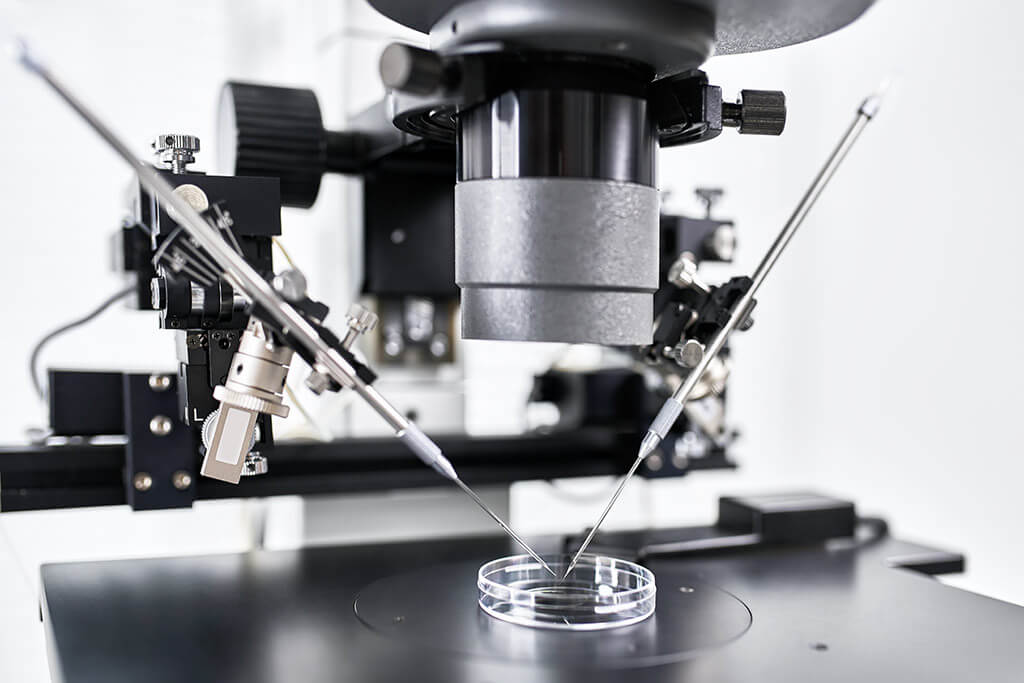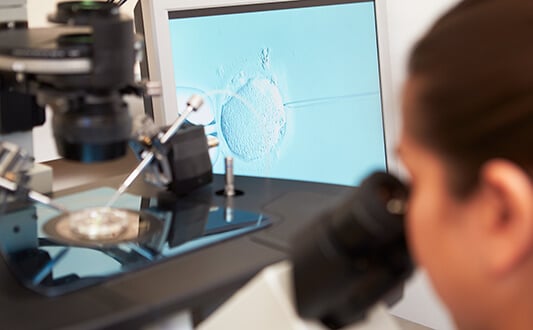Infertility is a medical condition whereby a couple is unable to conceive of a baby. Although they have tried the conventional method for over a year. There is a differentiation between male and female infertility. Luckily, long gone are the days when this diagnosis meant that you are doomed from having kids. Today, people are able to become parents almost at any age, without having perfect health conditions, if they are open to trying modern methods of reproduction.
Content
- Causes of infertility
- Treatment of female infertility abroad
- Treatment of male infertility abroad
- Assisted reproductive technologies (ART)
- Pricing
Causes of infertility
Infertility can be triggered by a whole range of reasons. Some of them are reversible, other can be temporary eliminated, allowing enough time to conceive a child naturally. You probably have also heard about the causes of irreversible infertility . In this case, pregnancy can be achieved with the help of assisted reproductive technologies.
Key factors of female infertility are:
- Endocrine factor when a process of egg maturation, suitable for fertilization, is dysfunctional (this is usually a consequence of hormonal imbalance)
- Tubal factor means that an egg is maturating but it is not able to meet the sperm as a result of obstruction in the fallopian tubes
- Uterine factor means that a fertilized egg cannot attach to the mucosa due to a thin endometrial layer, a change in the uterus shape or the presence of adhesions
- Immune factor presupposes the production of antibodies by the female organism which interfere with the process of fertilization
Key factors of male infertility are:
- Impaired spermatogenesis when the quality of sperm deteriorates, and the fertilization of the egg does not occur (due to varicocele, dyshormonal processes in the body, taking drugs or exposure to toxins)
- Obstruction of the vas deferens means that spermatozoa are produced in sufficient quantity, but cannot penetrate into the urethra and, consequently, into the vagina of the woman
- Genetic defects are present when spermatozoa are produced, but they have damaged genetic material
- Immune factor means that male’s organism produces antibodies that block the fertilizing capacity of spermatozoa
A couple undergoes a number of tests to find out the underlying cause of infertility. Knowing what the main pathogenetic mechanism of infertility development is, makes it possible to determine the best therapeutic tactics.
Treatment of female infertility abroad
Female infertility is cured in various ways depending on its cause.
- Endocrine infertility. Sometimes it is enough to provide the induction of ovulation with medications to ensure pregnancy. A woman receives hormonal remedies for several cycles, while trying to conceive a child. If pregnancy cannot be achieved, assisted reproductive technologies are used.
- Tubal infertility. Obstruction of the fallopian tubes can be reversible and irreversible. Reversible obstruction is caused by sexual infections, when inflammatory exudate accumulates in the tubes. Irreversible obstruction occurs when spikes form in the tubes. Then they need to be removed surgically. If there are no fallopian tubes at all, or if a woman refuses surgery, pregnancy can be achieved with IVF.
- Uterine infertility. An operation is needed to remove endometriosis foci, dissect the adhesions or changes in the uterus shape, depending on what is preventing the embryo implantation into the mucosa. In the future, it is possible to use hormonal drugs to achieve the optimal thickness of the endometrium for embryo adoption.
- Infertility due to the immune factor. Antibodies to spermatozoa usually accumulate in the cervical mucus. Therefore, the problem is solved using artificial insemination. Her partner’s sperm is injected directly into the uterus at the clinic, bypassing the cervical canal.
Treatment of male infertility abroad
Male infertility is also experienced as often as female infertility. It also has different treatment mechanisms depending on what the underlying causes for infertile are.
- Immature spermatozoa. Specialists determine the reason that the spermatogenesis is disturbed. Most often, this happens due to varicocele which is an expansion of the veins of the scrotum. An operation is usually performed, and in 3-6 months fertility is restored. One of the possible reasons is a deficiency of androgens, or male hormones (hypogonadism). The patient then requires testosterone replacement therapy for several months.
- Obstruction of the vas deferens requires surgery to restore their patency. If it does not bring any positive results, or the patient refuses surgery, ICSI (intracytoplasmic sperm injection) is prescribed. This is a method of fertilization whereby spermatozoa is manually introduced into the egg. Spermatozoa is obtained directly from the testicle after a puncture.
- Defect of genetic material. If the majority of spermatozoa have damaged DNA, conception will not happen, and if pregnancy does occur, the probability of miscarriage or malformations is very high. Therefore, the ICSI procedure is necessary. The doctor selects spermatozoa with intact DNA and inserts it into the egg.
- Immune infertility. The optimal solution is to achieve pregnancy using assisted reproductive technologies. If there are not many antibodies, it is possible for fertilization. The previously purified and processed sperm is used for the method of artificial insemination. If this treatment is ineffective, ICSI is used.
Prof. Kovács on Varicocele Treatment: How Sclerotherapy Restores Normal Blood Flow and Fertility
Assisted reproductive technologies (ART)
Aged patient frequently need ART to achieve fertilisation. ART is also required for young patients if prior treatment didn’t bring any result or surgery is required and one of the partners refuses to undergo treatment.
Thus, it is possible to use the following techniques:
- Intrauterine insemination means that sperm, sometimes collected for a few days, is purified and concentrated. This improves its quality. Then, using a catheter, the woman’s uterus is injected with sperm.
- In vitro fertilization (IVF) involves the fertilization of an egg in the laboratory. Its maturation is stimulated with drugs. The embryo is transferred to the uterus by a doctor using a flexible catheter.
- ICSI is a method that increases the efficiency of IVF with poor quality of sperm, but the method of egg fertilization differs. The doctor introduces the spermatozoon into its cytoplasm "manually".
- PGD. Preimplantation genetic diagnosis makes it possible to identify diseases in a future child even before the embryo is transferred to the uterus. This is necessary to reduce the risk of malformations and chromosomal abnormalities, the probability of which increases after 35 years of age. During the IVF procedure, several embryos are obtained. They choose the one that is devoid of gene and chromosomal mutations for transfer to the uterus.
- Donor cells. If a woman does not have her own eggs due to age or disease, she can use donor ones. It is also possible to use donor sperm if the man has genetic diseases that do not amount to obtaining quality spermatozoa.
- Surrogacy is used if the patient cannot carry the child due to health reasons or does not want to burden herself with pregnancy and childbirth. The essence of the method is that another woman nurtures the genetically native child. Surrogate motherhood is also indicated in case of habitual miscarriages. It is also used in cases where repeated transfer of embryos into the uterine cavity within the framework of IVF has not yielded results. That is, if the embryo cannot attach to the endometrium.
Pricing
The cost of infertility treatment varies considerably from country to country. It depends on many factors such as:
- Effectiveness of treatment means that the chance of achieving pregnancy after one cycle of IVF is about 30% in certain hospitals, when in others it reaches 50%
- A number of procedures used means that in addition to IVF, ICSI, PIKSI, PGD a number of other supporting techniques can be used
- Chosen IVF programme which may include additional services, such as cryopreservation of embryos or the use of donor biological material
- The number of attempts presupposes that it is not always possible to achieve pregnancy from the first try; sometimes it takes several cycles of IVF, which is more expensive
You are more likely to resolve the issue of infertility with a higher chance of success in European hospitals. More than 90% of couples achieve pregnancy one way or another if they follow the instructions of an experienced doctor. The average cost of treatment is as follows:
| Country | The average IVF cost |
|---|---|
| Germany | 14,420 EUR |
| Turkey | 11,200 EUR |
| Israel | 19,440 EUR |
Latest achievements in reproductive medicine are available at these centres. Here you can undergo IVF with an optimistic and expectant chance of success:
- Medicana International Istanbul Hospital
- Jinepol Womens Health and IVF Clinic Istanbul
- Acibadem Healthcare Group Istanbul
Choose treatment abroad and you will for sure get the best results!
Authors:
This article was edited by medical experts, board-certified doctors Dr. Nadezhda Ivanisova, and Dr. Bohdan Mykhalniuk. For the treatment of the conditions referred to in the article, you must consult a doctor; the information in the article is not intended for self-medication!
Our editorial policy, which details our commitment to accuracy and transparency, is available here. Click this link to review our policies.
Sources:
Sources:
Reproductive Medicine International
Read:
Don't know where to start?
Contact Booking Health







